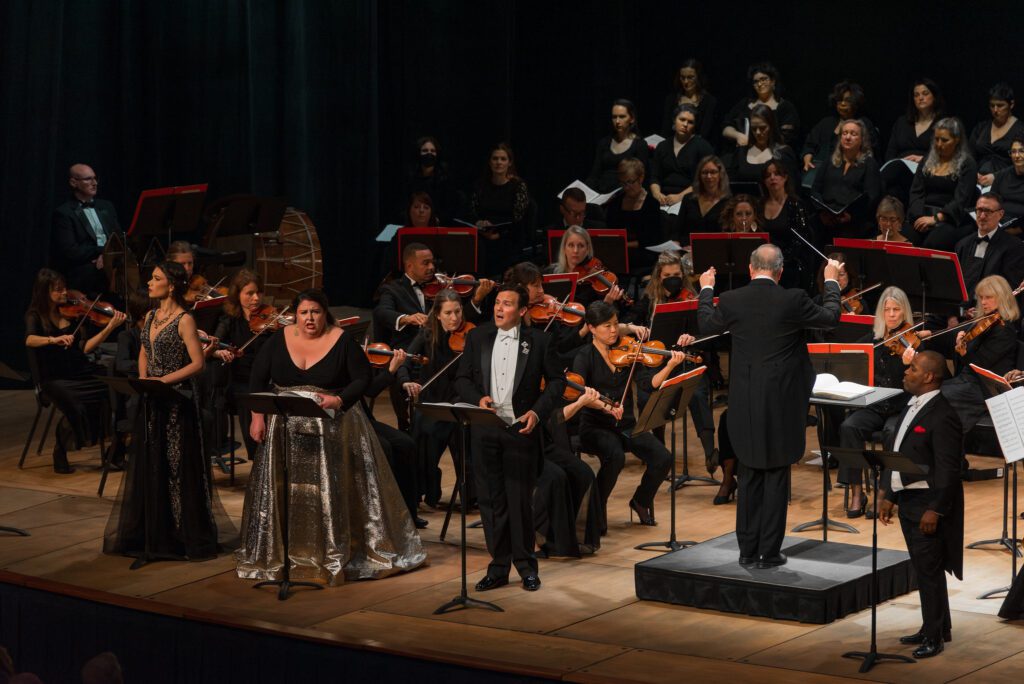A D.C. Premiere by Washington Concert Opera: Rossini’s ‘Ermione’
By • December 14, 2023 One Comment 670

The first event in Washington Concert Opera’s 37th season, on Dec. 2, was the D.C. premiere of Gioachino Rossini’s “Ermione,” an opera that “immediately sank into oblivion” in 1819, according to WCO co-founder Peter Russell.
Why did it fail? Musically, Rossini “might have just pushed the envelope a little too far” for the Naples audience, suggested Russell in his pre-concert remarks. And the story’s trajectory, from bleak to bleaker, probably didn’t help. “Love,” sang the chorus (in Italian), “you are the cause of these sad and wicked vicissitudes.”
Librettist Andrea Leone Tottola based his text on French playwright Jean Racine’s 1667 work “Andromaque,” set during the mopping up after the Trojan War (a Greek victory, you will recall).
Andromache (Andromaca in the opera), widow of slain Trojan prince Hector, has been taken prisoner by Pyrrhus (Pirro), a Greek king and the son of Hector’s killer, Achilles. Betrothed to Hermione (Ermione), Pyrrhus has been smitten by Andromache and wants to marry her instead.
Orestes (Oreste), who is in love with Hermione, arrives to urge the execution of Hector and Andromache’s son, heir to the Trojan throne. But Pyrrhus, needing leverage on Andromache, who remains faithful to the deceased Hector, has other ideas.
Remarkably, the translation projected above the stage of George Washington University’s Lisner Auditorium kept this nuanced narrative on track.
Rossini is no longer solely known for “The Barber of Seville,” a comic masterpiece, and for the catchy overtures to “William Tell” and other rarely performed works. However, his Naples operas, none comedies, are a heavy lift.
Composed with three bel canto stars in mind — Rossini’s muse and first wife, soprano Isabella Colbran, and two tenors under contract to the Teatro di San Carlo — they require “homogeneity of vocal mastery from top to bottom … to make their full effect,” Russell explained.
The casting advantage of WCO’s one-night-only, front-of-the-stage format came through in a big way, especially for the title role. Known for portraying Norma, another bel canto lead, soprano Angela Meade has sung Ermione more than any other modern diva, notably at the opera’s bicentennial production at the San Carlo. Though she offered little in the way of acting — which concert opera largely omits — that voice!
Ermione’s rival for Pirro’s favor, Andromaca, was portrayed by Italian American mezzo-soprano Ginger Costa-Jackson, likewise adept in the florid bel canto style. “Stand and sing” was not for her: she employed facial expressions, gestured with her arms and hands and strayed from her music stand.
After Costa-Jackson’s first-scene cavatina about her absent son (“Mia delizia!”), which proceeded to a fine back-and-forth with the men of the chorus, WCO Artistic Director and Conductor Antony Walker turned from the podium to kiss her hands. Slender, with long hair down her back and wearing a glittering necklace and earrings, Costa-Jackson was easy to picture as Carmen, a role for which she is in demand.
The two tenor leads were sung by David Portillo, as Pirro, and Lawrence Brownlee, as Oreste. Portillo shined when sustaining high notes, less so when delivering embroidered phrases in his lower range. Toward the end of the first act, Rossini lays out the situation’s romantic and political complexities by writing intricate ensembles of seven, and later all nine, characters. However, after the first scene of act two, when Andromaca agrees to marry Pirro to save her son, Pirro is, somewhat awkwardly, heard no more.
The second scene of act two begins an almost continuous showcase for Ermione, stunningly handled by Meade, who has to go from anger to faint hope to suicidal desperation. First, Ermione accuses Andromaca of stealing Pirro; Andromaca rejects the charge, saying that Ermione doesn’t understand, and exits. Ermione sends her love to Pirro via messenger: “Tell him that you saw me weeping.” Then, seeing Pirro and Andromaca on their way to be married (not shown in concert opera), she desires only vengeance.
At this point, Brownlee, as Oreste, became the sole male lead. A true leggero tenor, with an impressively flexible voice, he sometimes went up on the balls of his feet to hit high notes. Visually, this slight man’s pairing with Meade — Ermione baits him for his unwillingness to murder her betrayer — was less than ideal, but vocally their duets, before and after Pirro’s offstage death, were superlative.
A certain yearning quality in Brownlee’s singing went well with the ill-fated role. (Spoiler: Though Oreste thinks the news of Pirro’s death will be welcomed by Ermione, he couldn’t be more wrong. Ermione: “Did not my heart give the lie to what my lips asked of you?”)
The other cast members — Matthew Hill as Pilade, Kate Jackman as Cefisa, Erin Ridge as Cleone, Rolando Sanz as Attalo and Matthew Scollin as Fenicio — gave solid support. The act two duet by Hill and Scollin was a winning break from the wrenching Ermione-Oreste drama.
Under Walker, the orchestra of some 50 instrumentalists, and the chorus, prepared by WCO Chorus Master David Hanlon, did their usual fine job with Rossini’s score, which, without any of his familiar, often repurposed themes, felt continually alive and surprising.
The second production in WCO’s season will be Giacomo Puccini’s “La Rondine,” on Sunday, April 7, featuring Ailyn Pérez, Mario Chang, Deanna Breiwick and Jonathan Johnson.


It never ceases to amaze me how Anthony Walker recruits world-class singers for a company of relatively modest means. This performance was a prime example: Angela Meade and Lawrence Brownlee are among the world’s greatest opera stars. I don’t know how he does it, but I hope Mr. Walker (a former Georgetown neighbor of mine) keeps it up.